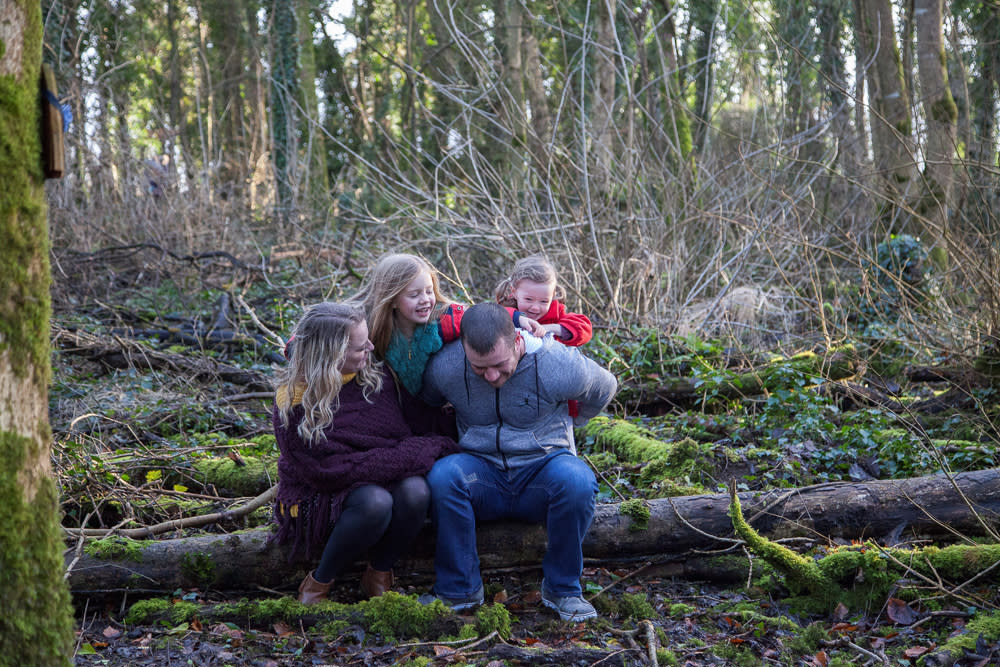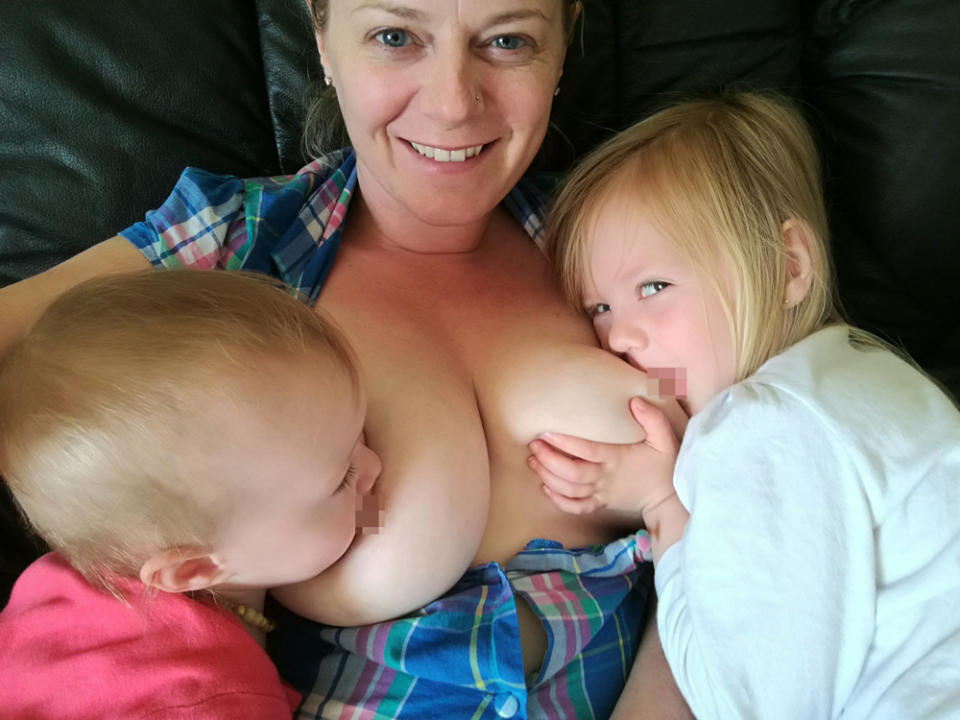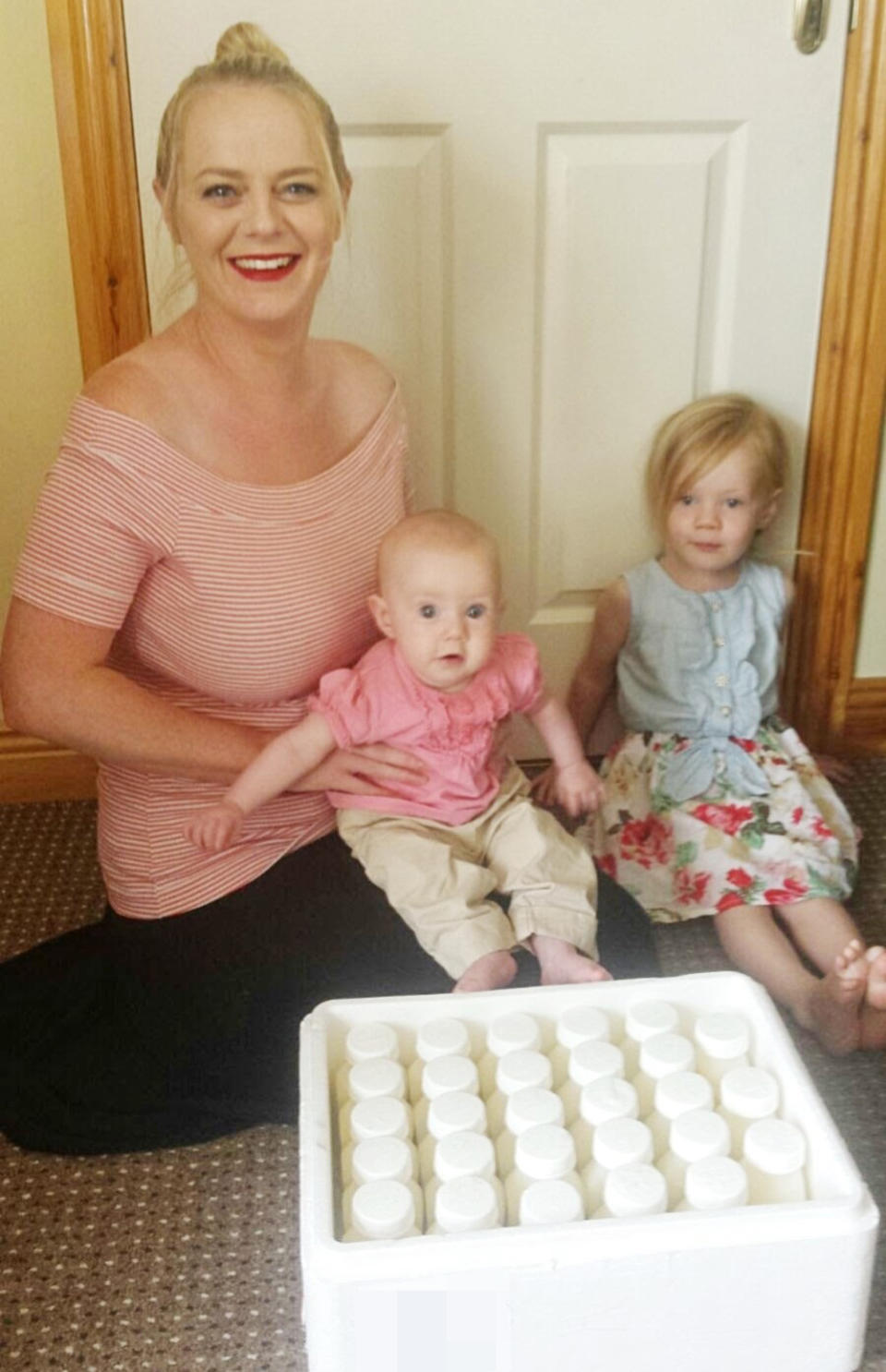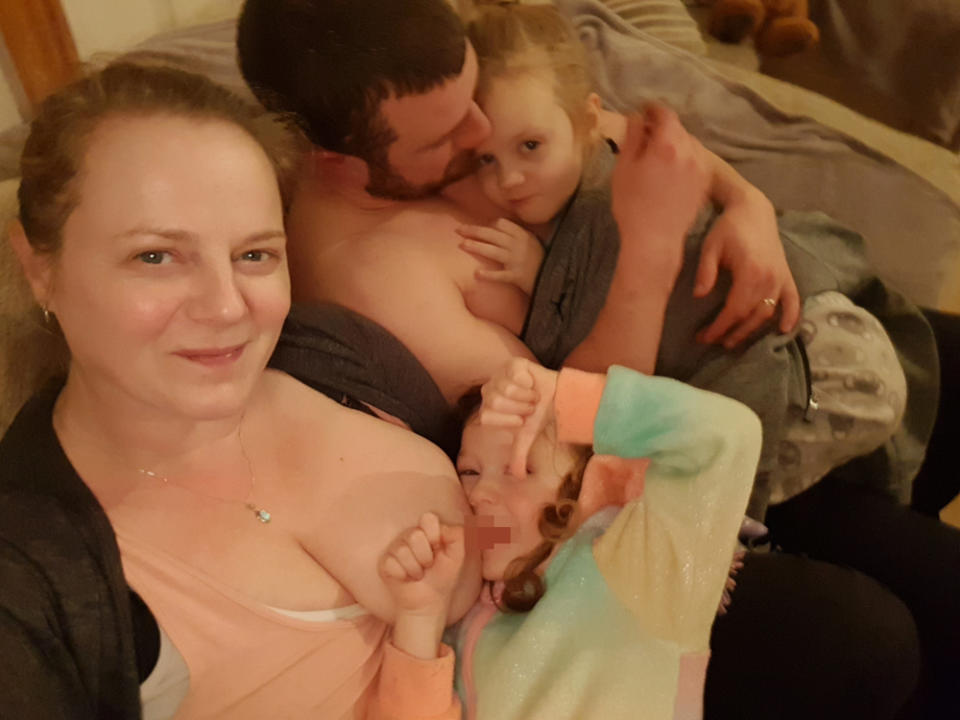Mum who tandem-breastfed her daughters credits extended breastfeeding for their hardy immune systems

A mum whose daughters breastfed in tandem, with one stopping just before she was five and the other continuing to nurse at four, credits extended breastfeeding for their hardy immune systems.
Natasha Keane, 38, a make-up artist, from Galway, Ireland, practises natural stage weaning – where a child decides for themselves when to stop breastfeeding.
And the mum-of-three, who also works with adults with disabilities, says she believes it has helped both Ellie, six, and Grace, four, build strong immune systems, as only one of them has ever been to the doctors with a bug.
“Ellie has never been to the doctor’s for a sickness bug in her life, and never needed antibiotics, and Grace has only been once for a chest infection she couldn’t shake,” the mum says.
“I absolutely believe that it’s breastfeeding that has made their immune systems so strong.”

Now Keane hopes to be able to highlight the benefits of extended breastfeeding, an umbrella term used to describe women who continue to nurse their children after one year, and is keen to defend a woman’s right to nurse in public.
“I try not to let the comments and stares get to me, but I have been made to feel uncomfortable,” she says.
“I find it such a huge double standard. It’s okay to put women in bikinis or lingerie on huge advertising billboards, but it’s not okay to let a mum to subtly feed her child?
“To me, breastfeeding is the most natural thing in the world.”
Despite now being a breastfeeding advocate, back when she was a first-time mum to son Stephen, now 19, when she was just 19, she had to stop breastfeeding after a few months due to medication. At that time, she believed nursing after a year was “creepy”.
“I wanted to do it for longer, but I was only 19 back then and didn’t think I could question my doctor,” she said.
“I cried so hard for about a week afterwards. Stephen struggled to take his bottle and it was very stressful.”
Read more: Viewers left in hysterics after little girl crashes her mum's live BBC News interview

When Keane fell pregnant with Ellie she wanted things to be different and joined a local breastfeeding group.
“I walked into my first meeting, and saw a woman tandem feeding her three-year-old and 18-month-old, with one at each breast,” she recalled.
“My jaw hit the floor. I genuinely had no idea it was possible to feed children past the age of one – let alone two at the same time. Instead of judging, I simply asked questions.”
After finding other similar groups and speaking to several other mums, who all practiced extended breastfeeding, she also read articles on the subject.
Combining her findings with information on the NHS website that said babies are passed valuable antibodies to help protect them against infection through their mother’s milk, she became increasingly convinced that this was the way forwards.
Meanwhile, she discovered that the World Health Organization states that breastfeeding can continue for up to two years and beyond.
According to its recommendations – made together with Unicef – children should start breastfeeding within an hour of being born and be exclusively nursed for six months, going on to be breastfed on demand. From six months onwards, they should begin eating safe and adequate foods while continuing to take their mum’s milk.
Read more: Heartwarming moment nurse was able to hold her two-year-old son after 11 weeks apart

Buoyed by her findings, Keane became an advocate for natural stage weaning, saying: “There’s a saying in the community – ‘Don’t offer and don’t refuse.’
“Putting that into practice with my girls meant that, while I wasn’t sitting them down like clockwork, offering them my milk, I wasn’t saying no if they asked.”
Breastfeeding Ellie with no set deadline in mind of when to stop, when Grace arrived two years later, she tandem-nursed them – one at each breast – together.
“I tandem-fed for two years,” she said. “I was a little apprehensive at first about the practicalities of it all, but you find your own groove, and it gets easier the more you do it.
“As Ellie was a little older by then, I could explain to her to be patient and let Grace latch on and settle in first. Every single night, they would fall asleep without fail, one on each breast, holding hands.”
Read more: Baby born with amazing head of hair so thick it was spotted on the scan

While Ellie stopped wanting to breastfeed just before she turned five, Grace continues to nurse once in the morning and once in the evening.
But Keane still deals with negativity, which she blames on people’s miseducation, rather than on deliberate nastiness.
“People see breastfeeding as fair game – something everyone is allowed to have an opinion on and criticise,” she said.
“I never would, as it is every mum’s choice, but I know if I said something about bottle-feeding, it would be unacceptable.”
She says she’s had to deal with some difficult comments over the years.
“When Grace was just eight months old, I had somebody say to me that I should be force-feeding her into weaning by that point,” she says.
“I just thought, ‘What would you say if you knew I’m also feeding her older sister?’”
But she doesn’t believe that people are deliberately trying to shame her, instead attributing the negativity to a lack of education about the subject.
“We have lactation specialists, but not many of them, and most doctors and nurses aren’t armed to the teeth with the same level of information. That’s how you end up with mums like I used to be, who don’t realise you can feed past a year, or think it’s wrong to.”

By sharing her story, Keane, who says her husband Adam, 35, is fully supportive of her feeding journey, hopes to normalise breastfeeding and reassure other mums they do not have to stop before they are ready.
Also aware that some mums cannot breastfeed, she wants to encourage them to find their local milk banks, where women can donate their own excess supply.
In the past, she has donated six litres, which went on to help 22 different premature babies, as well giving a stash to other mums who could not nurse themselves as they were having chemotherapy but did not want to give their babies formula.
“It’s up to every mum as an individual what they want to do, and I understand that some have tried and tried, but simply cannot breastfeed,” she said.
“Because of the constant flow of oxytocin – known as the love hormone – breastfeeding is a great mood booster. I had postnatal depression with Stephen and Ellie, so thought it’d be written in stone that I would with Grace, but I didn’t.
“Before you make a comment, educate yourself. If a mum ever mentions something to me that I don’t understand, I will keep my mouth shut, then go away and look it up. Whether I agree or not is beside the point. It’s education that’s important.”
Additional reporting PA Real Life.



